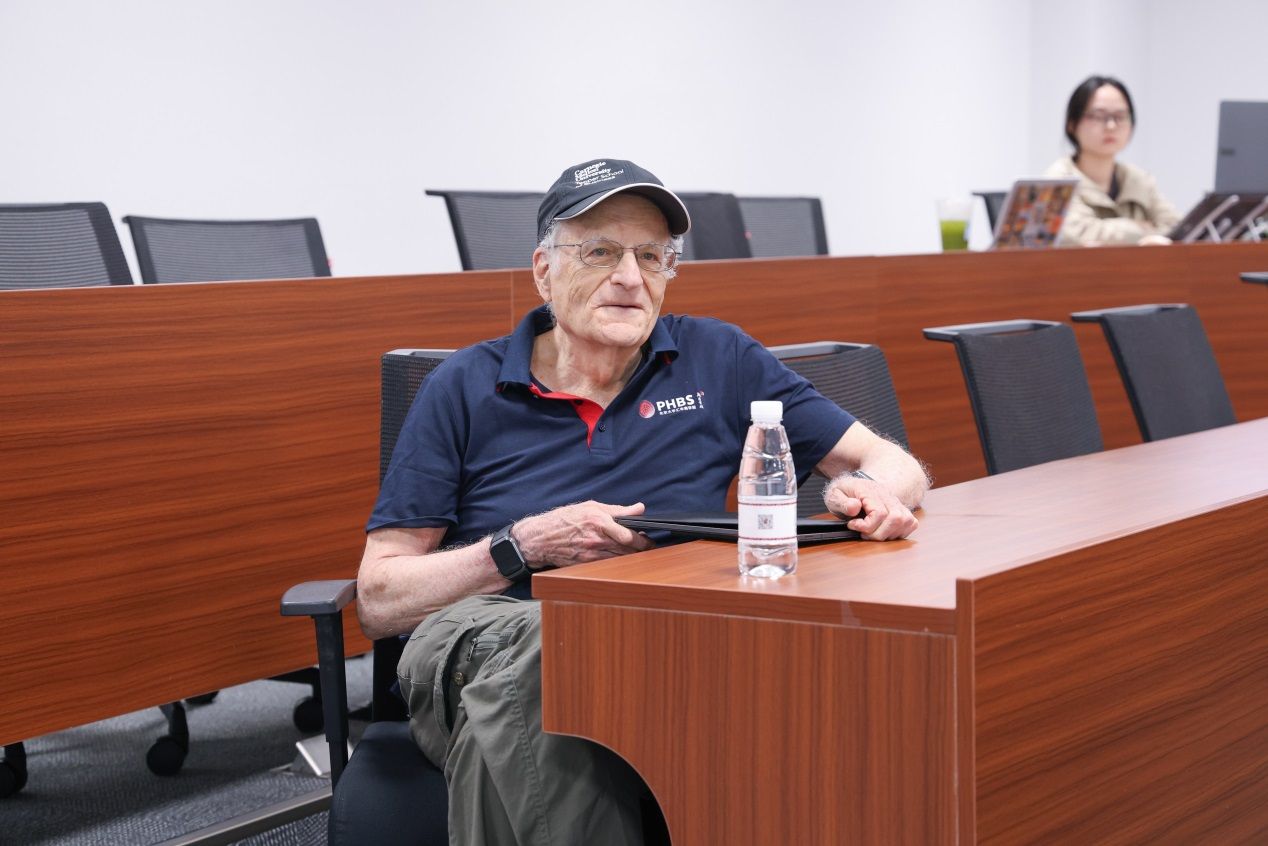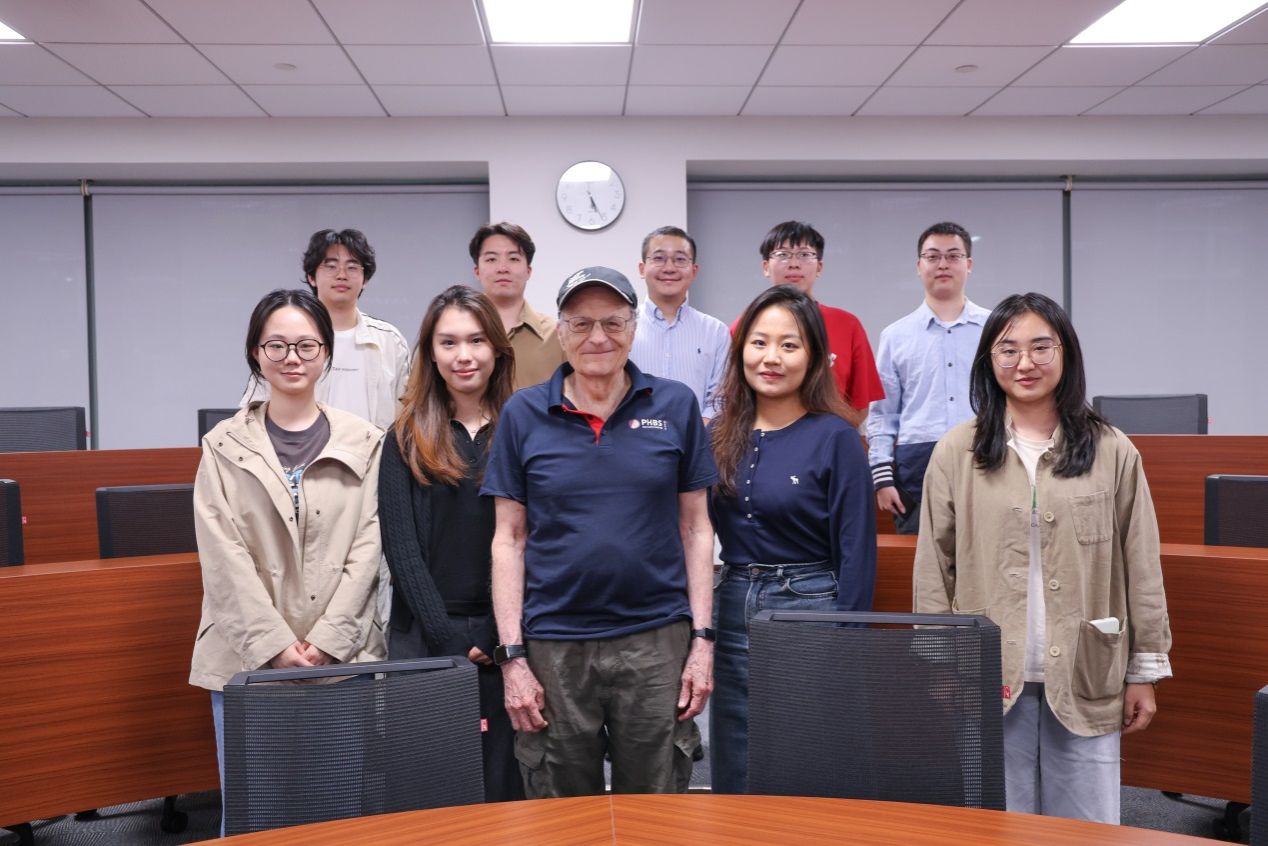On October 29–30, Peking University HSBC Business School (PHBS) held the fourth session of its “Dialogue with a Nobel Laureate: Student Tea Talk Series at PHBS,” bringing together nine Economics PhD candidates from the 2024 cohort for an inspiring academic dialogue with Professor Thomas J. Sargent, winner of the 2011 Nobel Prize in Economics and honorary director of the Sargent Institute of Quantitative Economics and Finance at PHBS.
Over two afternoons, students presented their research in areas such as green finance, urban economics, venture capital, and corporate mergers and acquisitions. Each presentation was followed by thoughtful comments and guidance from Professor Sargent.

Day One: Green Finance and Urban Development
On October 29, Wu Qianfeng presented his work on production networks and corporate green transition. Professor Sargent acknowledged the long-term potential of the topic and suggested ways to strengthen the theoretical framework.
Chen Chenxuan shared empirical findings on the entry of foreign enterprises into China. Professor Sargent found the topic interesting and encouraged a deeper look at differences across source countries.
He Pengyu investigated whether corporate green innovation improves both financial and environmental performance, drawing on evidence from Chinese listed companies. Professor Sargent raised questions about endogeneity and offered suggestions for further analysis.
Fang Chongyu introduced a theoretical model of bank repo choice and interest rate spreads. Professor Sargent affirmed the relevance of the research and proposed refinements to the model setup.
Feng Xiaoruo presented a study on residential segregation in Chinese cities. Professor Sargent compared patterns in China and the U.S., and recommended incorporating factors such as ethnicity and household registration into the analysis.
Day Two: Capital Markets and Industrial Organization
On October 30, Zha Jiajing explored how venture capital influences competitive dynamics among startups. Professor Sargent advised her to clarify the mechanism through which VC affects competition, and noted that effective models are often simple.
Chai Yuheng presented his research on output price rigidity, information frictions, and debt financing. Professor Sargent recommended using diagrams to illustrate timelines and causal logic, and stressed the importance of focusing on key ideas.
Wang Shiyao studied how intangible capital investment affects firm performance in the stock market. Professor Sargent affirmed the importance of the topic and suggested exploring historical differences across industries.
Xue Rongli shared her work on how anti-monopoly reviews shape corporate merger activity. Professor Sargent acknowledged the policy relevance of her findings and asked about the specifics of China’s Anti-Monopoly Law.
In Their Own Words: What the Students Said
Chai Yuheng:
“I realized that academic research isn’t just about building rigorous models—it’s also about being able to communicate complex ideas clearly. Professor Sargent’s comments showed me that presenting the core of your research concisely is an essential skill. In the future, I’ll focus more on making my logic intuitive and finding the right balance between depth and clarity.”
Feng Xiaoruo:
“Discussing my research with Professor Sargent was an invaluable experience. Talking with other students also helped me learn about different research areas. His comments broadened my perspective and inspired me to look more systematically at how ethnicity, household registration, and social mobility shape urban spatial structure—this will really help me as I develop my model and policy analysis.”
Wu Qianfeng:
“I was deeply impressed by Professor Sargent’s rigorous scholarship and approachable manner. He listened closely to every presentation and gave us sharp, focused advice. His guidance helped me re-examine and refine my research question. I’ve come away with a deeper appreciation of what it means to learn broadly but focus intensely. The academic road is long, but I’m more motivated than ever to keep going.”
Zha Jiajing:
“I feel incredibly lucky that my first English presentation as a PhD student was for Professor Sargent. It’s an experience I’ll never forget. He was fully engaged throughout both sessions, following each student’s line of thinking, asking thoughtful questions, and even taking notes during my presentation. I was struck by his intellectual curiosity, his deep focus, and his ability to get straight to the heart of a problem. This conversation helped me understand my own research much more deeply.”

Background Information
Professor Thomas Sargent, a leading scholar in macroeconomics, joined PHBS in 2017 and helped establish the Sargent Institute of Quantitative Economics and Finance. He has been active in bringing together international scholars and strengthening the school’s research environment. He also helped design and leads the Economics PhD program, and continues to teach advanced courses such as “Advanced Macroeconomics.” To date, the Sargent Institute has admitted seven cohorts of PhD students and organized eight international conferences, creating ongoing exchanges between Chinese researchers and global experts.
The “Dialogue with a Nobel Laureate: Student Tea Talk Series at PHBS” was launched by the Sargent Institute to offer students regular, close-contact guidance from Professor Sargent, helping them tackle research challenges and gain new inspiration.
By Annie Jin
















